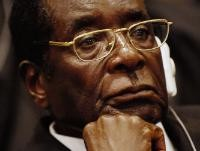A coalition government formed early last year is seen by many Zimbabweans as the last hope for a country that has long teetered on the edge of open conflict. In February 2009, the opposition Movement for Democratic Change (MDC) party agreed to form a fragile unity government with the Zimbabwe African National Union -- Patriotic Front (Zanu-PF), the party of long-time autocrat, President Robert Mugabe.
The two parties' power-sharing deal, brokered by the Southern African Development Corporation, was meant to head off potential widespread violence following disputed presidential and parliamentary elections in March 2008. The election, in which Mugabe finished second and Zanu-PF lost control of parliament, led to a violent crackdown, with Mugabe and his supporters essentially suspending the democratic process in order to retain power.
Zimbabweans' desire for change was fueled by years of disastrous governance resulting in some of the worst conditions found in Africa, outside of an active war zone. "The annual inflation rate is over 165,000 percent, the world's highest," International Crisis Group, a Brussels-based think-tank, reported around the time of the 2008 election. "Unemployment is over 85 percent, poverty over 90 percent, and foreign reserves almost depleted. Over 4 million people are in desperate need of food. HIV/AIDS and malnutrition kill thousands every month."

